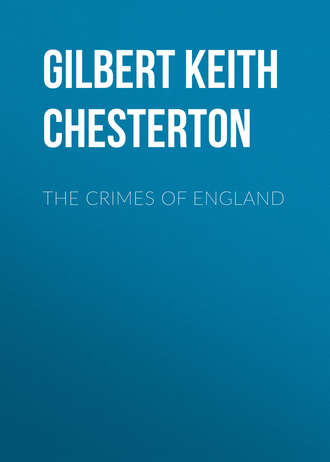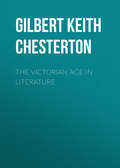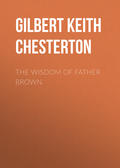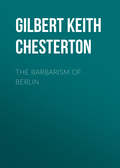
Гилберт Кит Честертон
The Crimes of England
IV —The Coming of the Janissaries
The late Lord Salisbury, a sad and humorous man, made many public and serious remarks that have been proved false and perilous, and many private and frivolous remarks which were valuable and ought to be immortal. He struck dead the stiff and false psychology of "social reform," with its suggestion that the number of public-houses made people drunk, by saying that there were a number of bedrooms at Hatfield, but they never made him sleepy. Because of this it is possible to forgive him for having talked about "living and dying nations": though it is of such sayings that living nations die. In the same spirit he included the nation of Ireland in the "Celtic fringe" upon the west of England. It seems sufficient to remark that the fringe is considerably broader than the garment. But the fearful satire of time has very sufficiently avenged the Irish nation upon him, largely by the instrumentality of another fragment of the British robe which he cast away almost contemptuously in the North Sea. The name of it is Heligoland; and he gave it to the Germans.
The subsequent history of the two islands on either side of England has been sufficiently ironical. If Lord Salisbury had foreseen exactly what would happen to Heligoland, as well as to Ireland, he might well have found no sleep at Hatfield in one bedroom or a hundred. In the eastern isle he was strengthening a fortress that would one day be called upon to destroy us. In the western isle he was weakening a fortress that would one day be called upon to save us. In that day his trusted ally, William Hohenzollern, was to batter our ships and boats from the Bight of Heligoland; and in that day his old and once-imprisoned enemy, John Redmond, was to rise in the hour of English jeopardy, and be thanked in thunder for the free offer of the Irish sword. All that Robert Cecil thought valueless has been our loss, and all that he thought feeble our stay. Among those of his political class or creed who accepted and welcomed the Irish leader's alliance, there were some who knew the real past relations between England and Ireland, and some who first felt them in that hour. All knew that England could no longer be a mere mistress; many knew that she was now in some sense a suppliant. Some knew that she deserved to be a suppliant. These were they who knew a little of the thing called history; and if they thought at all of such dead catchwords as the "Celtic fringe" for a description of Ireland, it was to doubt whether we were worthy to kiss the hem of her garment. If there be still any Englishman who thinks such language extravagant, this chapter is written to enlighten him.
In the last two chapters I have sketched in outline the way in which England, partly by historical accident, but partly also by false philosophy, was drawn into the orbit of Germany, the centre of whose circle was already at Berlin. I need not recapitulate the causes at all fully here. Luther was hardly a heresiarch for England, though a hobby for Henry VIII. But the negative Germanism of the Reformation, its drag towards the north, its quarantine against Latin culture, was in a sense the beginning of the business. It is well represented in two facts; the barbaric refusal of the new astronomical calendar merely because it was invented by a Pope, and the singular decision to pronounce Latin as if it were something else, making it not a dead language but a new language. Later, the part played by particular royalties is complex and accidental; "the furious German" came and passed; the much less interesting Germans came and stayed. Their influence was negative but not negligible; they kept England out of that current of European life into which the Gallophil Stuarts might have carried her. Only one of the Hanoverians was actively German; so German that he actually gloried in the name of Briton, and spelt it wrong. Incidentally, he lost America. It is notable that all those eminent among the real Britons, who spelt it right, respected and would parley with the American Revolution, however jingo or legitimist they were; the romantic conservative Burke, the earth-devouring Imperialist Chatham, even, in reality, the jog-trot Tory North. The intractability was in the Elector of Hanover more than in the King of England; in the narrow and petty German prince who was bored by Shakespeare and approximately inspired by Handel. What really clinched the unlucky companionship of England and Germany was the first and second alliance with Prussia; the first in which we prevented the hardening tradition of Frederick the Great being broken up by the Seven Years' War; the second in which we prevented it being broken up by the French Revolution and Napoleon. In the first we helped Prussia to escape like a young brigand; in the second we helped the brigand to adjudicate as a respectable magistrate. Having aided his lawlessness, we defended his legitimacy. We helped to give the Bourbon prince his crown, though our allies the Prussians (in their cheery way) tried to pick a few jewels out of it before he got it. Through the whole of that period, so important in history, it must be said that we were to be reckoned on for the support of unreformed laws and the rule of unwilling subjects. There is, as it were, an ugly echo even to the name of Nelson in the name of Naples. But whatever is to be said of the cause, the work which we did in it, with steel and gold, was so able and strenuous that an Englishman can still be proud of it. We never performed a greater task than that in which we, in a sense, saved Germany, save that in which a hundred years later, we have now, in a sense, to destroy her. History tends to be a facade of faded picturesqueness for most of those who have not specially studied it: a more or less monochrome background for the drama of their own day. To these it may well seem that it matters little whether we were on one side or the other in a fight in which all the figures are antiquated; Bonaparte and Blucher are both in old cocked hats; French kings and French regicides are both not only dead men but dead foreigners; the whole is a tapestry as decorative and as arbitrary as the Wars of the Roses. It was not so: we fought for something real when we fought for the old world against the new. If we want to know painfully and precisely what it was, we must open an old and sealed and very awful door, on a scene which was called Ireland, but which then might well have been called hell.
Having chosen our part and made war upon the new world, we were soon made to understand what such spiritual infanticide involved; and were committed to a kind of Massacre of the Innocents. In Ireland the young world was represented by young men, who shared the democratic dream of the Continent, and were resolved to foil the plot of Pitt; who was working a huge machine of corruption to its utmost to absorb Ireland into the Anti-Jacobin scheme of England. There was present every coincidence that could make the British rulers feel they were mere abbots of misrule. The stiff and self-conscious figure of Pitt has remained standing incongruously purse in hand; while his manlier rivals were stretching out their hands for the sword, the only possible resort of men who cannot be bought and refuse to be sold. A rebellion broke out and was repressed; and the government that repressed it was ten times more lawless than the rebellion. Fate for once seemed to pick out a situation in plain black and white like an allegory; a tragedy of appalling platitudes. The heroes were really heroes; and the villains were nothing but villains. The common tangle of life, in which good men do evil by mistake and bad men do good by accident, seemed suspended for us as for a judgment. We had to do things that not only were vile, but felt vile. We had to destroy men who not only were noble, but looked noble. They were men like Wolfe Tone, a statesman in the grand style who was not suffered to found a state; and Robert Emmet, lover of his land and of a woman, in whose very appearance men saw something of the eagle grace of the young Napoleon. But he was luckier than the young Napoleon; for he has remained young. He was hanged; not before he had uttered one of those phrases that are the hinges of history. He made an epitaph of the refusal of an epitaph: and with a gesture has hung his tomb in heaven like Mahomet's coffin. Against such Irishmen we could only produce Castlereagh; one of the few men in human records who seem to have been made famous solely that they might be infamous. He sold his own country, he oppressed ours; for the rest he mixed his metaphors, and has saddled two separate and sensible nations with the horrible mixed metaphor called the Union. Here there is no possible see-saw of sympathies as there can be between Brutus and Caesar or between Cromwell and Charles I.: there is simply nobody who supposes that Emmet was out for worldly gain, or that Castlereagh was out for anything else. Even the incidental resemblances between the two sides only served to sharpen the contrast and the complete superiority of the nationalists. Thus, Castlereagh and Lord Edward Fitzgerald were both aristocrats. But Castlereagh was the corrupt gentleman at the Court, Fitzgerald the generous gentleman upon the land; some portion of whose blood, along with some portion of his spirit, descended to that great gentleman, who – in the midst of the emetic immoralism of our modern politics – gave back that land to the Irish peasantry. Thus again, all such eighteenth-century aristocrats (like aristocrats almost anywhere) stood apart from the popular mysticism and the shrines of the poor; they were theoretically Protestants, but practically pagans. But Tone was the type of pagan who refuses to persecute, like Gallio: Pitt was the type of pagan who consents to persecute; and his place is with Pilate. He was an intolerant indifferentist; ready to enfranchise the Papists, but more ready to massacre them. Thus, once more, the two pagans, Tone and Castlereagh, found a pagan end in suicide. But the circumstances were such that any man, of any party, felt that Tone had died like Cato and Castlereagh had died like Judas.
The march of Pitt's policy went on; and the chasm between light and darkness deepened. Order was restored; and wherever order spread, there spread an anarchy more awful than the sun has ever looked on. Torture came out of the crypts of the Inquisition and walked in the sunlight of the streets and fields. A village vicar was slain with inconceivable stripes, and his corpse set on fire with frightful jests about a roasted priest. Rape became a mode of government. The violation of virgins became a standing order of police. Stamped still with the same terrible symbolism, the work of the English Government and the English settlers seemed to resolve itself into animal atrocities against the wives and daughters of a race distinguished for a rare and detached purity, and of a religion which makes of innocence the Mother of God. In its bodily aspects it became like a war of devils upon angels; as if England could produce nothing but torturers, and Ireland nothing but martyrs. Such was a part of the price paid by the Irish body and the English soul, for the privilege of patching up a Prussian after the sabre-stroke of Jena.
But Germany was not merely present in the spirit: Germany was present in the flesh. Without any desire to underrate the exploits of the English or the Orangemen, I can safely say that the finest touches were added by soldiers trained in a tradition inherited from the horrors of the Thirty Years' War, and of what the old ballad called "the cruel wars of High Germanie." An Irishman I know, whose brother is a soldier, and who has relatives in many distinguished posts of the British army, told me that in his childhood the legend (or rather the truth) of '98 was so frightfully alive that his own mother would not have the word "soldier" spoken in her house. Wherever we thus find the tradition alive we find that the hateful soldier means especially the German soldier. When the Irish say, as some of them do say, that the German mercenary was worse than the Orangemen, they say as much as human mouth can utter. Beyond that there is nothing but the curse of God, which shall be uttered in an unknown tongue.
The practice of using German soldiers, and even whole German regiments, in the make-up of the British army, came in with our German princes, and reappeared on many important occasions in our eighteenth-century history. They were probably among those who encamped triumphantly upon Drumossie Moor, and also (which is a more gratifying thought) among those who ran away with great rapidity at Prestonpans. When that very typical German, George III., narrow, serious, of a stunted culture and coarse in his very domesticity, quarrelled with all that was spirited, not only in the democracy of America but in the aristocracy of England, German troops were very fitted to be his ambassadors beyond the Atlantic. With their well-drilled formations they followed Burgoyne in that woodland march that failed at Saratoga; and with their wooden faces beheld our downfall. Their presence had long had its effect in various ways. In one way, curiously enough, their very militarism helped England to be less military; and especially to be more mercantile. It began to be felt, faintly of course and never consciously, that fighting was a thing that foreigners had to do. It vaguely increased the prestige of the Germans as the military people, to the disadvantage of the French, whom it was the interest of our vanity to underrate. The mere mixture of their uniforms with ours made a background of pageantry in which it seemed more and more natural that English and German potentates should salute each other like cousins, and, in a sense, live in each other's countries. Thus in 1908 the German Emperor was already regarded as something of a menace by the English politicians, and as nothing but a madman by the English people. Yet it did not seem in any way disgusting or dangerous that Edward VII. should appear upon occasion in a Prussian uniform. Edward VII. was himself a friend to France, and worked for the French Alliance. Yet his appearance in the red trousers of a French soldier would have struck many people as funny; as funny as if he had dressed up as a Chinaman.
But the German hirelings or allies had another character which (by that same strain of evil coincidence which we are tracing in this book) encouraged all that was worst in the English conservatism and inequality, while discouraging all that was best in it. It is true that the ideal Englishman was too much of a squire; but it is just to add that the ideal squire was a good squire. The best squire I know in fiction is Duke Theseus in "The Midsummer Night's Dream," who is kind to his people and proud of his dogs; and would be a perfect human being if he were not just a little bit prone to be kind to both of them in the same way. But such natural and even pagan good-nature is consonant with the warm wet woods and comfortable clouds of South England; it never had any place among the harsh and thrifty squires in the plains of East Prussia, the land of the East Wind. They were peevish as well as proud, and everything they created, but especially their army, was made coherent by sheer brutality. Discipline was cruel enough in all the eighteenth-century armies, created long after the decay of any faith or hope that could hold men together. But the state that was first in Germany was first in ferocity. Frederick the Great had to forbid his English admirers to follow his regiments during the campaign, lest they should discover that the most enlightened of kings had only excluded torture from law to impose it without law. This influence, as we have seen, left on Ireland a fearful mark which will never be effaced. English rule in Ireland had been bad before; but in the broadening light of the revolutionary century I doubt whether it could have continued as bad, if we had not taken a side that forced us to flatter barbarian tyranny in Europe. We should hardly have seen such a nightmare as the Anglicising of Ireland if we had not already seen the Germanising of England. But even in England it was not without its effects; and one of its effects was to rouse a man who is, perhaps, the best English witness to the effect on the England of that time of the Alliance with Germany. With that man I shall deal in the chapter that follows.
V —The Lost England
Telling the truth about Ireland is not very pleasant to a patriotic Englishman; but it is very patriotic. It is the truth and nothing but the truth which I have but touched on in the last chapter. Several times, and especially at the beginning of this war, we narrowly escaped ruin because we neglected that truth, and would insist on treating our crimes of the '98 and after as very distant; while in Irish feeling, and in fact, they are very near. Repentance of this remote sort is not at all appropriate to the case, and will not do. It may be a good thing to forget and forgive; but it is altogether too easy a trick to forget and be forgiven.
The truth about Ireland is simply this: that the relations between England and Ireland are the relations between two men who have to travel together, one of whom tried to stab the other at the last stopping-place or to poison the other at the last inn. Conversation may be courteous, but it will be occasionally forced. The topic of attempted murder, its examples in history and fiction, may be tactfully avoided in the sallies; but it will be occasionally present in the thoughts. Silences, not devoid of strain, will fall from time to time. The partially murdered person may even think an assault unlikely to recur; but it is asking too much, perhaps, to expect him to find it impossible to imagine. And even if, as God grant, the predominant partner is really sorry for his former manner of predominating, and proves it in some unmistakable manner – as by saving the other from robbers at great personal risk – the victim may still be unable to repress an abstract psychological wonder about when his companion first began to feel like that. Now this is not in the least an exaggerated parable of the position of England towards Ireland, not only in '98, but far back from the treason that broke the Treaty of Limerick and far onwards through the Great Famine and after. The conduct of the English towards the Irish after the Rebellion was quite simply the conduct of one man who traps and binds another, and then calmly cuts him about with a knife. The conduct during the Famine was quite simply the conduct of the first man if he entertained the later moments of the second man, by remarking in a chatty manner on the very hopeful chances of his bleeding to death. The British Prime Minister publicly refused to stop the Famine by the use of English ships. The British Prime Minister positively spread the Famine, by making the half-starved populations of Ireland pay for the starved ones. The common verdict of a coroner's jury upon some emaciated wretch was "Wilful murder by Lord John Russell": and that verdict was not only the verdict of Irish public opinion, but is the verdict of history. But there were those in influential positions in England who were not content with publicly approving the act, but publicly proclaimed the motive. The Times, which had then a national authority and respectability which gave its words a weight unknown in modern journalism, openly exulted in the prospect of a Golden Age when the kind of Irishman native to Ireland would be "as rare on the banks of the Liffey as a red man on the banks of the Manhattan." It seems sufficiently frantic that such a thing should have been said by one European of another, or even of a Red Indian, if Red Indians had occupied anything like the place of the Irish then and since; if there were to be a Red Indian Lord Chief Justice and a Red Indian Commander-in-Chief, if the Red Indian Party in Congress, containing first-rate orators and fashionable novelists, could have turned Presidents in and out; if half the best troops of the country were trained with the tomahawk and half the best journalism of the capital written in picture-writing, if later, by general consent, the Chief known as Pine in the Twilight, was the best living poet, or the Chief Thin Red Fox, the ablest living dramatist. If that were realised, the English critic probably would not say anything scornful of red men; or certainly would be sorry he said it. But the extraordinary avowal does mark what was most peculiar in the position. This has not been the common case of misgovernment. It is not merely that the institutions we set up were indefensible; though the curious mark of them is that they were literally indefensible; from Wood's Halfpence to the Irish Church Establishment. There can be no more excuse for the method used by Pitt than for the method used by Pigott. But it differs further from ordinary misrule in the vital matter of its object. The coercion was not imposed that the people might live quietly, but that the people might die quietly. And then we sit in an owlish innocence of our sin, and debate whether the Irish might conceivably succeed in saving Ireland. We, as a matter of fact, have not even failed to save Ireland. We have simply failed to destroy her.
It is not possible to reverse this judgment or to take away a single count from it. Is there, then, anything whatever to be said for the English in the matter? There is: though the English never by any chance say it. Nor do the Irish say it; though it is in a sense a weakness as well as a defence. One would think the Irish had reason to say anything that can be said against the English ruling class, but they have not said, indeed they have hardly discovered, one quite simple fact – that it rules England. They are right in asking that the Irish should have a say in the Irish government, but they are quite wrong in supposing that the English have any particular say in English government. And I seriously believe I am not deceived by any national bias, when I say that the common Englishman would be quite incapable of the cruelties that were committed in his name. But, most important of all, it is the historical fact that there was another England, an England consisting of common Englishmen, which not only certainly would have done better, but actually did make some considerable attempt to do better. If anyone asks for the evidence, the answer is that the evidence has been destroyed, or at least deliberately boycotted: but can be found in the unfashionable corners of literature; and, when found, is final. If anyone asks for the great men of such a potential democratic England, the answer is that the great men are labelled small men, or not labelled at all; have been successfully belittled as the emancipation of which they dreamed has dwindled. The greatest of them is now little more than a name; he is criticised to be underrated and not to be understood; but he presented all that alternative and more liberal Englishry; and was enormously popular because he presented it. In taking him as the type of it we may tell most shortly the whole of this forgotten tale. And, even when I begin to tell it, I find myself in the presence of that ubiquitous evil which is the subject of this book. It is a fact, and I think it is not a coincidence, that in standing for a moment where this Englishman stood, I again find myself confronted by the German soldier.
The son of a small Surrey farmer, a respectable Tory and churchman, ventured to plead against certain extraordinary cruelties being inflicted on Englishmen whose hands were tied, by the whips of German superiors; who were then parading in English fields their stiff foreign uniforms and their sanguinary foreign discipline. In the countries from which they came, of course, such torments were the one monotonous means of driving men on to perish in the dead dynastic quarrels of the north; but to poor Will Cobbett, in his provincial island, knowing little but the low hills and hedges around the little church where he now lies buried, the incident seemed odd – nay, unpleasing. He knew, of course, that there was then flogging in the British army also; but the German standard was notoriously severe in such things, and was something of an acquired taste. Added to which he had all sorts of old grandmotherly prejudices about Englishmen being punished by Englishmen, and notions of that sort. He protested, not only in speech, but actually in print. He was soon made to learn the perils of meddling in the high politics of the High Dutch militarists. The fine feelings of the foreign mercenaries were soothed by Cobbett being flung into Newgate for two years and beggared by a fine of £1000. That small incident is a small transparent picture of the Holy Alliance; of what was really meant by a country, once half liberalised, taking up the cause of the foreign kings. This, and not "The Meeting of Wellington and Blucher," should be engraved as the great scene of the war. From this intemperate Fenians should learn that the Teutonic mercenaries did not confine themselves solely to torturing Irishmen. They were equally ready to torture Englishmen: for mercenaries are mostly unprejudiced. To Cobbett's eye we were suffering from allies exactly as we should suffer from invaders. Boney was a bogey; but the German was a nightmare, a thing actually sitting on top of us. In Ireland the Alliance meant the ruin of anything and everything Irish, from the creed of St. Patrick to the mere colour green. But in England also it meant the ruin of anything and everything English, from the Habeas Corpus Act to Cobbett.
After this affair of the scourging, he wielded his pen like a scourge until he died. This terrible pamphleteer was one of those men who exist to prove the distinction between a biography and a life. From his biographies you will learn that he was a Radical who had once been a Tory. From his life, if there were one, you would learn that he was always a Radical because he was always a Tory. Few men changed less; it was round him that the politicians like Pitt chopped and changed, like fakirs dancing round a sacred rock. His secret is buried with him; it is that he really cared about the English people. He was conservative because he cared for their past, and liberal because he cared for their future. But he was much more than this. He had two forms of moral manhood very rare in our time: he was ready to uproot ancient successes, and he was ready to defy oncoming doom. Burke said that few are the partisans of a tyranny that has departed: he might have added that fewer still are the critics of a tyranny that has remained. Burke certainly was not one of them. While lashing himself into a lunacy against the French Revolution, which only very incidentally destroyed the property of the rich, he never criticised (to do him justice, perhaps never saw) the English Revolution, which began with the sack of convents, and ended with the fencing in of enclosures; a revolution which sweepingly and systematically destroyed the property of the poor. While rhetorically putting the Englishman in a castle, politically he would not allow him on a common. Cobbett, a much more historical thinker, saw the beginning of Capitalism in the Tudor pillage and deplored it; he saw the triumph of Capitalism in the industrial cities and defied it. The paradox he was maintaining really amounted to the assertion that Westminster Abbey is rather more national than Welbeck Abbey. The same paradox would have led him to maintain that a Warwickshire man had more reason to be proud of Stratford-on-Avon than of Birmingham. He would no more have thought of looking for England in Birmingham than of looking for Ireland in Belfast.
The prestige of Cobbett's excellent literary style has survived the persecution of his equally excellent opinions. But that style also is underrated through the loss of the real English tradition. More cautious schools have missed the fact that the very genius of the English tongue tends not only to vigour, but specially to violence. The Englishman of the leading articles is calm, moderate, and restrained; but then the Englishman of the leading articles is a Prussian. The mere English consonants are full of Cobbett. Dr. Johnson was our great man of letters when he said "stinks," not when he said "putrefaction." Take some common phrase like "raining cats and dogs," and note not only the extravagance of imagery (though that is very Shakespearean), but a jagged energy in the very spelling. Say "chats" and "chiens" and it is not the same. Perhaps the old national genius has survived the urban enslavement most spiritedly in our comic songs, admired by all men of travel and continental culture, by Mr. George Moore as by Mr. Belloc. One (to which I am much attached) had a chorus —
"O wind from the South
Blow mud in the mouth
Of Jane, Jane, Jane."
Note, again, not only the tremendous vision of clinging soils carried skywards in the tornado, but also the suitability of the mere sounds. Say "bone" and "bouche" for mud and mouth and it is not the same. Cobbett was a wind from the South; and if he occasionally seemed to stop his enemies' mouths with mud, it was the real soil of South England.
And as his seemingly mad language is very literary, so his seemingly mad meaning is very historical. Modern people do not understand him because they do not understand the difference between exaggerating a truth and exaggerating a lie. He did exaggerate, but what he knew, not what he did not know. He only appears paradoxical because he upheld tradition against fashion. A paradox is a fantastic thing that is said once: a fashion is a more fantastic thing that is said a sufficient number of times. I could give numberless examples in Cobbett's case, but I will give only one. Anyone who finds himself full in the central path of Cobbett's fury sometimes has something like a physical shock. No one who has read "The History of the Reformation" will ever forget the passage (I forget the precise words) in which he says the mere thought of such a person as Cranmer makes the brain reel, and, for an instant, doubt the goodness of God; but that peace and faith flow back into the soul when we remember that he was burned alive. Now this is extravagant. It takes the breath away; and it was meant to. But what I wish to point out is that a much more extravagant view of Cranmer was, in Cobbett's day, the accepted view of Cranmer; not as a momentary image, but as an immovable historical monument. Thousands of parsons and penmen dutifully set down Cranmer among the saints and martyrs; and there are many respectable people who would do so still. This is not an exaggerated truth, but an established lie. Cranmer was not such a monstrosity of meanness as Cobbett implies; but he was mean. But there is no question of his being less saintly than the parsonages believed; he was not a saint at all; and not very attractive even as a sinner. He was no more a martyr for being burned than Crippen for being hanged.







